
Britain’s fiercest libel firm can pursue anyone, anywhere
The government is trying to rein in firms like Carter-Ruck. It’s not easy
One morning in April 2017, Jen McAdam was scrolling through emails in her council house in central Scotland when she saw one from an unfamiliar address. It had an attachment, which she opened. When she read it she thought she was going to faint.
McAdam had been through a rough few years. In 2010 she had developed chronic fatigue syndrome, rendering her effectively bedbound. The small IT consultancy she had started folded. She burned through her savings. Then at the start of 2015 she had lost her beloved father, Bill.
Bill, who was 92 when he died, worked for decades as a miner. He didn’t drink or smoke, McAdam recalls; he saved, which meant he was able to leave Jen and her sister £15,000 each. Stricken by grief though she was, the legacy was a lifeline for McAdam. By then she knew how quickly money can disappear if you’re not in work. She was determined to try to use it to get some financial security.
In early 2016 McAdam’s best friend suggested she think about cryptocurrency. Bitcoin, the best known digital coin, was beginning to make waves. McAdam wasn’t sure – she didn’t understand the technicalities – but crypto did seem as though it was making ordinary people like her well-off.
In March of that year McAdam bought packages of a digital currency called OneCoin. It seemed legitimate to her (an impression aided by the fact that its co-founder, Ruja Ignatova, had addressed a conference organised by the Economist). OneCoin’s backers offered bonuses to those who recruited new members, and incentives to early adopters. She brought her friends and family into the fold, who in turn brought their loved ones in. McAdam became popular with OneCoin leaders, who celebrated her as a success story at conferences. McAdam estimates that her extended network put about £250,000 into the scheme.
She can’t recall the precise moment when doubts crept in. She remembers OneCoin’s bank account details changing with alarming regularity. On 11 November 2016 McAdam received a stream of messages from Tim Curry, a critic of the scheme based in California. Curry bombarded her with information, which he claimed proved OneCoin was a fraud. She tried to forget about the details, but by the start of 2017 she was worried. She heard a rumour that the police were investigating OneCoin, and on 27 March 2017 she contacted an officer working on the case. According to McAdam, he confirmed that OneCoin was suspected of being a Ponzi scheme. That conversation extinguished her last remaining hope that she would see her money again.
Full of shame for having encouraged people to invest, she began to post warnings in OneCoin groups online. She contacted other investors facing similar problems to talk through their losses. Then she set up a victims-support network, which quickly ballooned into multiple WhatsApp groups covering every country in which McAdam could find victims. The stories she heard chilled her.
“I was hearing from people all around the world absolutely feeling suicidal. I was hearing stories of their families breaking up, grown men and women crying, old pensioners crying, from all different countries – it was utter devastation,” she said. (Their stories are now documented in McAdam’s book.)
McAdam decided to hold a webinar so she and other OneCoin critics could alert as many victims as possible. The event went off without a hitch and McAdam continued her campaign to organise and connect victims to each other. One attendee recorded the webinar, and uploaded it to YouTube to reach a wider audience. McAdam thought nothing of it.
It was exactly three weeks after the webinar that the email arrived. The attachment was a letter from lawyers representing OneCoin and Ignatova, its co-founder. “Our clients’ current instructions”, it stated, “are to initiate proceedings against you for defamation.” The only way to avoid a court case, the letter said, was to refrain from publishing similar allegations and to retract the webinar video (which had actually been uploaded by someone else). She had seven days to act.
“My heart was beating out of my chest. I just wanted to scream,” McAdam recalled. The name on the firm’s teal letterhead was one she hadn’t heard before: Carter-Ruck.
 Dr Ruja Ignatova, co-founder of OneCoin
Dr Ruja Ignatova, co-founder of OneCoin
Britain’s libel lawyers are the most intimidating in the world. They are also among the most expensive. British libel cases routinely cost hundreds of thousands of pounds to defend, and London’s top libel lawyers command rates of more than £500 per hour. The costs of defending a suit in Britain are much greater than in comparable European countries (they can be higher in the US, but so is the bar for making a successful claim). It’s not unusual for libel suits in France or Italy to conclude with total costs of less than £15,000; in London, they can surpass £1m. Those who receive letters from firms like Carter-Ruck often back down not because they have a weak case, but because the cost of fighting a claim can become crippling. Even if victorious, defendants can find themselves on the hook for lawyers’ fees.
Britain’s libel industry (which is technically the libel industry of England and Wales, as the other nations of the United Kingdom have their own legal systems) didn’t develop in this direction by chance: it was pushed there by libel lawyers. One name in particular is associated with this evolution: Carter-Ruck. Carter-Ruck is not the only firm defending the reputations of wealthy clients: Schillings, Mishcon de Reya and Harbottle & Lewis all offer robust libel services to those rich enough to afford them. But Carter-Ruck was one of the first firms in the country to specialise in libel work for claimants and, according to defence lawyers, it remains the most effective. “They probably are the most feared claimant firm in the UK,” said one defence lawyer. The firm, which also does some work defending media organisations, is discreet, and relatively little information about it exists in the public domain.
Few would argue that libel law shouldn’t exist. Freedom of expression needs to be balanced with other “duties and responsibilities”, as the European Convention on Human Rights puts it, including the protection of people’s reputations. Much of the work libel lawyers do helps maintain this balance. Often their adversaries are the British tabloids, whose unusually aggressive pursuit of salacious stories has, as a public inquiry noted in 2012, “wreaked havoc on the lives of innocent people”.
In practice, however, the British libel industry has made it harder for people to subject the wealthy and powerful to legitimate scrutiny. There have been several attempts over the years to correct this. The spectacle of Russian oligarchs pursuing journalists in British courts, never a very edifying one, became too much for politicians to bear after Russia invaded Ukraine last year. Shortly after the war started, an American congressman proposed travel bans on several libel lawyers in London, including Carter-Ruck’s managing partner Nigel Tait. Dominic Raab, then Britain’s justice secretary, began designing legislation to tackle abuses of libel law by wealthy people seeking to avoid scrutiny (a practice campaigners call Strategic Lawsuits Against Public Participation, or SLAPPs).
Like previous attempts to reform Britain’s libel industry, however, the anti-SLAPP proposals left two fundamental problems untouched. First, English law offers distinct technical advantages to claimants, presuming the falsity of the defamatory statement and placing the burden of proof on the defendant to show it is true. Second, mounting a defence is so expensive that it creates an inherent imbalance of power between wealthy plaintiffs and those they are pursuing.
These persistent factors have led to a distinctively aggressive approach to libel litigation in Britain. One former Carter-Ruck employee says that the main objective in many of the cases they worked on was simply “to muddy the waters and cast doubt on particular allegations”, even if there might be some substance to them. (Carter-Ruck said this description was “as absurd as it is false”.) Another ex-employee put it more succinctly: “You have to be a professional bastard: that’s your job.”
As McAdam’s case suggests, it is not just British journalists who have reason to fear Carter-Ruck and its competitors. In recent years British libel lawyers have expanded their target range to include bloggers, booksellers, social-media users, whistleblowers and even government regulators. Being in another country offers little protection. In 2020 a global survey of investigative journalists reporting on financial crime found that more legal threats against them originated from Britain than any other country that wasn’t their own. If you have ever spoken out against one of the global super-rich with some link to Britain you are potentially in a London libel lawyer’s crosshairs, no matter how few followers you have or where you live.
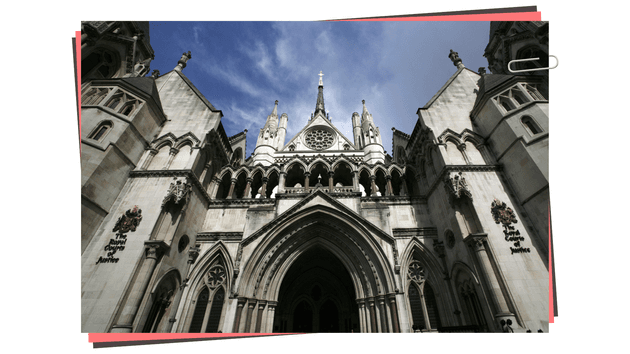 The Royal Courts of Justice in London
Shutterstock
The Royal Courts of Justice in London
Shutterstock
Carter-Ruck has just 10 partners and a further nine solicitors and associates. It is located in a grey building in London’s legal district, which it shares with several other companies. In keeping with its emphasis on discretion, the firm volunteers little about itself, even its past: the “History” section on its website runs to all of 99 words. There is scant publicly available information on Nigel Tait, the firm’s leader since 2012. The motto on its homepage is “Protect what’s yours”.
The firm was founded in 1981, but its history could be said to begin in 1275, when a statute was introduced to English law which sought to protect powerful men from scandal and gossip. “Libel was introduced as an alternative dispute resolution to stop young men of position in society killing one another by duels because of blots on the family escutcheon,” said Mark Stephens, a veteran media lawyer.
In the 16th century an additional crime of seditious libel was introduced – statements intended to incite rebellion against a state or monarch. This was punishable by the removal of the offender’s hand. An offence of slander entailed the removal of one’s ears. (Libel is defamation that’s published; slander is the spoken kind.) Repeat offenders had the letters “SL” – for seditious libel – branded onto their face.
Although it has been centuries since any defendant had their ears removed, British libel law retains something of its aristocratic DNA: the person claiming to have been defamed is the one presumed to be telling the truth, unlike in the legal traditions of continental Europe and America.
Until the mid-20th century libel was a somewhat specialist area of law. But then in 1944 a lawyer called Peter Carter-Ruck came back from active duty as a gunner in the Royal Artillery and set about transforming it into a lucrative industry.
Carter-Ruck had been offered a job heading a small libel practice called Oswald Hickson, Collier & Co, which then worked mainly in defence of regional newspapers. Carter-Ruck quickly displayed a knack for gaining the trust of members of the elite and massaging minor disputes into expensive litigation, from which he profited handsomely.
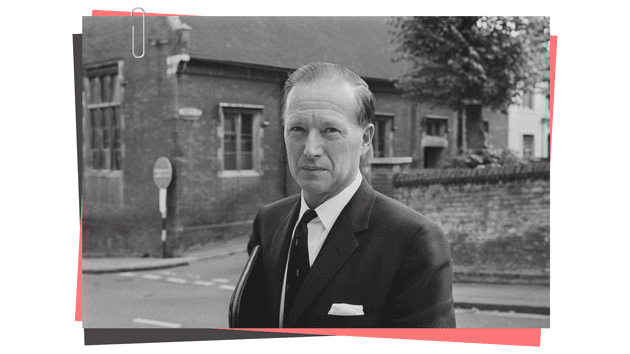 Peter Carter-Ruck in the 1960s
Dunne/Daily Express/Hulton Archive/Getty Image
Peter Carter-Ruck in the 1960s
Dunne/Daily Express/Hulton Archive/Getty Image
In the 1950s Carter-Ruck met Randolph Churchill, son of Winston, who became a close friend and profitable client. In 1963 Churchill instructed Carter-Ruck to sue Private Eye, a satirical news magazine, over its suggestion that Randolph’s forthcoming biography of his father would gloss over accusations that he had been reckless with British soldiers’ lives. Carter-Ruck threatened not only the editor but “all those concerned with the production of Private Eye”. Under Churchill’s instruction, he attempted to retain every senior libel barrister in the country to prevent Private Eye from mounting a defence, a sign of the combativeness that would distinguish his near-six-decade career.
Private Eye swiftly apologised, paid the other side’s legal costs, and bought advertising space in another paper for a public apology after Churchill and Carter-Ruck deemed the magazine’s own “facetious and deliberately insincere”. (Private Eye has since styled the firm as “Carter-Fuck”.) The Churchill case gave Carter-Ruck a taste for claimant work, and by the mid-1970s it was becoming his principal occupation.
Carter-Ruck injected a new aggression into libel practice. At the time, claimants usually started the process of complaint by asking their lawyer to make a discreet call to the editor of a publication: often, that was all it took to get a clarification or retraction. Carter-Ruck encouraged them to threaten litigation as an opening gambit. The firm also pushed up the ceiling of fees, charging ever more in a field of law that had not, historically, commanded vertiginous costs. “He sort of invented libel as an industry,” said David Hooper, a former colleague of Carter-Ruck.
Carter-Ruck also led the way in helping foreign clients use British courts. Princess Elizabeth Bagaya of Toro, one-time foreign secretary of Uganda, retained him to sue several British newspapers that had reported Idi Amin’s stated reasons for firing her (a series of lurid but unsubstantiated complaints about her behaviour). Carter-Ruck won substantial settlements from at least five newspapers, positioning himself as the lawyer to call for disgruntled aristocrats around the world.
According to Hooper, his former colleague, Carter-Ruck displayed a dismissive attitude to partners at the firm, and often clashed with them. “He was a man who didn’t understand what partnership was,” said Hooper. Eventually the partners forced him out and he founded Peter Carter-Ruck and Partners, the precursor of the firm that operates today.
 Princess Elizabeth Bagaya of Toro sued several papers for libel
Paul Harris/Getty Images
Princess Elizabeth Bagaya of Toro sued several papers for libel
Paul Harris/Getty Images
Peter Carter-Ruck and Partners’ foundation coincided with the stratospheric rise of the City of London. After Margaret Thatcher’s decision to deregulate the London Stock Exchange, the capital saw an explosion of new financial activity: bankers, brokers and businesses swam in a glut of money coursing through the City, and lawyers began hiking their fees.
The parallel rise of an ever-more-scurrilous tabloid press and burgeoning celebrity culture provided rich pickings for libel lawyers. As claims grew more frequent and more aggressive, jury awards soared: while in the 1950s none had topped £15,000, in 1989 a jury awarded one claimant £1.5m.
In 1998 Carter-Ruck was pushed out once again after getting into a power struggle with his new partners. Carter-Ruck the firm was only just getting going, however. Conditional fee agreements (essentially “no win, no fee” deals) had started to take off in the mid-1990s. A new act in 1999 extended their potential use in civil cases. A stated aim of this new law was to widen access to justice, but one aspect of it was that it allowed more of the costs to be foisted on the losing side – a shift far more worrying for cash-strapped defendants than for deep-pocketed plaintiffs. Lawyers who had been hired under conditional fee agreements were allowed to increase their fees by as much as 100% in some cases to compensate for the risk of getting no fees if they lost. Vanquished defendants were left having to cover much of the bill.
A global super-rich class was meanwhile emerging, driven in part by the chaotic privatisation of state assets in the former Soviet Union. Carter-Ruck cemented its position as reputation-management royalty for this new global elite. It was helped by the fact that British courts took a broad-minded view of which cases they were prepared to hear, including ones in which only a tiny proportion of the offending publication’s readers were based in Britain. Carter-Ruck developed relationships with sanctioned individuals from Myanmar, petrostates in the Middle East and Russian oligarchs. (A former Carter-Ruck employee, who worked for the firm in the 2000s-2010s, recalls that the first question asked when considering taking on a new customer was, “Does the client have the funds?” Carter-Ruck said that this characterisation was “entirely false”, and noted its pro-bono work on behalf of charities and others.)
In the late 1990s Carter-Ruck persuaded the British courts to process the libel claim of one of the richest men in Russia, Boris Berezovsky, against Forbes, a magazine published and predominantly distributed in America (the Russian won). As Carter-Ruck homed in on political elites, its rival Schillings specialised in celebrities. Together the firms made London what it is today, a city many call “the libel capital of the world”.
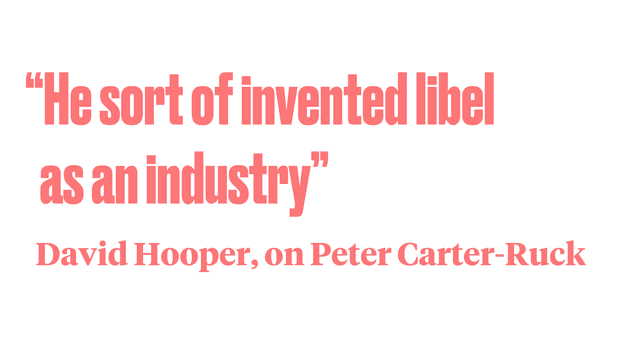
Trainee lawyers at Carter-Ruck were given a literary reading list as well as a legal one, according to a former employee who received it over a decade ago. One title on the list was Niccolo Machiavelli’s The Prince. Another was Sun Tzu’s The Art of War.
A Carter-Ruck lawyer’s art of war begins with the legal letter. Journalists planning to publish revelatory scoops usually approach the subjects of their reporting before publication to get their comments on allegations against them. If the subject is rich enough, and the allegations serious enough, they will often have their lawyers respond to the journalists.
The letters Carter-Ruck sends are no more aggressive than those of other law firms (some even believe they are more measured), but they are undoubtedly pugnacious. “Some of the language in those letters was just totally ridiculous,” a former employee recalled. “Everything was ‘egregious’ or ‘reprehensible’ ... I’ve never quite understood what egregious actually means. But you’re writing the letter for two people: the recipient and the client. And people don’t instruct Carter-Ruck to be meek and mild.”
It is not simply the tone of the letters that intimidates. Claims of severe impropriety against the journalist or publisher are common. A few years ago Global Witness, an NGO, was preparing to publish a report into alleged money laundering in the Democratic Republic of Congo involving Dan Gertler, a mining magnate. It put the allegations, which Gertler told the Bureau of Investigative Journalism (TBIJ) were “spurious” and “false”, to the businessman for comment. Carter-Ruck responded on Gertler’s behalf. Attempting to turn the tables, the firm said there were “strong suspicions” that two of Global Witness’s own staff had engaged in “serious misconduct”, supposedly attempting to pay bribes for information in Congo. The NGO found the allegation absurd. Neither employee had even been involved in investigating Gertler. And one had left Global Witness more than a decade earlier, years before the alleged bribery. “If [Carter-Ruck] had done a minimum amount of research they would have known it could not be true,” said someone familiar with the case.
 Dan Gertler used Carter-Ruck to respond to allegations made by Global Witness, an NGO
Simon Dawson/Bloomberg via Getty Images
Dan Gertler used Carter-Ruck to respond to allegations made by Global Witness, an NGO
Simon Dawson/Bloomberg via Getty Images
Even organs of the state have been on the receiving end of Carter-Ruck letters. In 2016 the Financial Conduct Authority (FCA), a British regulator, published a warning notice about the risks of OneCoin, the crypto scheme in which Jen McAdam had lost her inheritance from her father. In the summer of 2017 Carter-Ruck, instructed by OneCoin, demanded the notice be removed. Within three weeks the FCA had taken the notice down (the FCA told TBIJ this was because the firm’s activities “did not require regulation”). Carter-Ruck promptly contacted OneCoin’s lawyers in other countries to alert them to this, seeking the removal of similar notices posted by their own regulators, which looked to their British counterpart as a bellwether. The FCA’s reversal infuriated OneCoin critics: just months after the notice’s disappearance, with the fraud going strong, OneCoin’s co-founder vanished. (Ignatova is on the FBI’s Ten Most Wanted Fugitives List.)
Other weapons in Carter-Ruck’s arsenal have included the super-injunction, a legal order that not only prevents a news outlet from running a story but which demands the injunction itself remain secret. In 2009 the Guardian obtained a preliminary report suggesting that waste belonging to the commodities trader Trafigura, which had been dumped at several sites in Ivory Coast, could pose serious health risks. Carter-Ruck, Trafigura’s lawyers, obtained a super-injunction. The report ended up being published by WikiLeaks, and several weeks later a British MP found out about the original gag and raised it in parliament, where speakers are exempt from libel suits.
Carter-Ruck’s eagerness to interrogate and confront the claims of newspapers has not always been applied to those of its own clients. In 2019 the firm sued two Italian newspaper groups for defamation on behalf of a businessman and his two companies, whom the papers had accused of importing sanctioned Iranian oil and being implicated in a corruption investigation in Italy. Nowadays companies are required to submit proof of actual or likely financial loss caused by the alleged defamation, and the claimant gave the court documentation that included invoices for PR services the businessman said he had retained. But when an investigator hired by one of the defendants looked into the PR company, they found it had no VAT number, no business-registration number and left no record on its country’s company register. The investigator even travelled to its stated address, but found no evidence that the company operated there. An analysis of the PR firm’s logo, conducted by the defence, suggested that it had been lifted from a Detroit department store. It all added up, a defence barrister argued in court, to the invoices being “not very good forgeries”. The judge ruled that this was outside the scope of the trial, but rebuffed the claimants’ request to have the forgery accusation struck from the record. (The businessman told TBIJ that the newspapers’ original claims about him were “false” and maintained that the invoices were provided by the PR firm and “the costs were properly incurred”.)
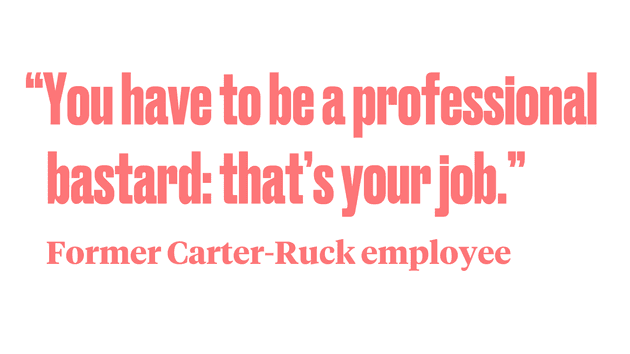
There is no evidence Carter-Ruck itself was involved in preparing the documentation. But the affair does raise serious questions about the due diligence conducted by the firm on a central aspect of its client’s case.
When TBIJ approached Carter-Ruck for comment on the practices and client choices outlined in this piece, Carter-Ruck said: “We hold ourselves to the highest possible standards in all aspects of our conduct and dealings with our clients, opponents and indeed the court … we seek to protect and enforce our clients’ rights and interests robustly and make no apology for doing so, but we do so fully within the rules.”
The firm added that it frequently declined to act on behalf of potential clients if “for example, we consider their conduct or views to be beyond the pale of a civilised democratic society”.
For all the criticism it has received, Carter-Ruck still enjoys prestige within the legal profession. Several former employees said they held the firm in high regard, rating the legal prowess of its top brass. “You got thrown in at the deep end,” a former employee said. “Doing stuff on Friday evenings, getting injunctions against the newspapers – it’s exciting.” It was “rigorous, exacting and with no room for errors”, said another. Several former staffers said they felt that Carter-Ruck had provided unparalleled training in disputes.
Sometimes the firm’s targets were tabloids abusing their power. Carter-Ruck won significant damages for a mechanic whom the News of The World had wrongly accused of financing terrorism, and a Muslim bus driver falsely accused by the Sun of removing passengers in order to pray. (“There was an element of enjoyment in going into those little battles with the tabloids,” said a former lawyer at the firm.)
But sometimes the work made even Carter-Ruck’s own employees uneasy. One of these occasions was during the Harlequin case in the early 2010s. Harlequin was a company that had promised to build properties in the Caribbean that investors could lease out. People poured their savings into it, but hardly anything was ever built. One investor, Erica Broughton, was a former ironing woman who had put her and her lorry-driver husband’s savings into Harlequin. When the firm failed to refund her money she set up a website called Harlequin Property Problems.
Harlequin called Carter-Ruck, which wrote to Broughton and threatened her with “injunctive relief” – in short, that she would be taken to court if she did not take down her site. Terrified of being sued, she complied. Investors, unaware of the controversy surrounding the scheme, continued to put their money into Harlequin for another three years before it crumbled. In 2022, some 10 years after Carter-Ruck ceased representing Harlequin, the company’s chairman, David Ames, was sentenced to 12 years in prison following an investigation by Britain’s Serious Fraud Office. Ames was found to have defrauded investors of some £226m between 2010 (the year Broughton invested) and 2015. Some victims had to remortgage their homes; others were forced to delay their retirements. Broughton was still so spooked she wouldn’t read out her testimony at Ames’s trial. (She declined to speak to TBIJ.)
“Harlequin were an important client of the firm,” recalled one former Carter-Ruck employee. “It’s cases like that that do make you feel a bit queasy with hindsight.”
In 2013 Britain’s parliament enacted sweeping reforms to libel law aimed at levelling the playing field between claimants and defendants. The Defamation Act let journalists plead a new kind of defence – arguing that their publication was in the public interest even if it could not be proved absolutely true. (Truth is always an absolute defence in libel cases.) The act also made it harder for rich foreigners without any ties to Britain to litigate their cases in London courts (so-called “libel tourism”) by introducing a new test for judges to determine whether London was the “most appropriate” forum. Individuals had to prove they had suffered or were likely to suffer “serious” harm – a new threshold – and companies had to demonstrate that they had suffered or were likely to suffer serious financial loss as a result of the published allegations in order to sue.
But the reforms were not as effective as they sounded. The “libel tourism” protections were undermined by the fact that so many of the world’s oligarchs and kleptocrats had already bought luxury property in London, which was often enough to justify them using its courts. Even when it is possible for a defendant to demonstrate that London is not an appropriate place to hear their case, it can be eye-wateringly expensive to do so. In 2021 the children of Azerbaijan’s former security chief sued Spanish newspapers in London over a Spanish-language article published in Spain that raised questions about the source of their stunning wealth. The judge ruled that the Azerbaijanis had no right to sue in Britain, but the Spanish newspapers spent tens of thousands of pounds before the case even reached court.
Firms like Schillings expanded their range of non-legal reputation-management services after 2013, hiring experts in cyber-security, digital forensics and military intelligence. For those who stuck to defamation law, meanwhile, the rise of social media massively expanded the material over which the litigious could sue.
One businessman who has made use of the full arsenal of London’s defamation and reputation-management industry is Mohamed Amersi, a tycoon, philanthropist and political donor. Before becoming a figure on the British political scene, Amersi had advised on billions of dollars’ worth of telecoms deals in the former Soviet Union. Since 2017 he and his partner have donated more than £750,000 to Britain’s ruling Conservative party, generosity which, coupled with his business background, has attracted much scrutiny.
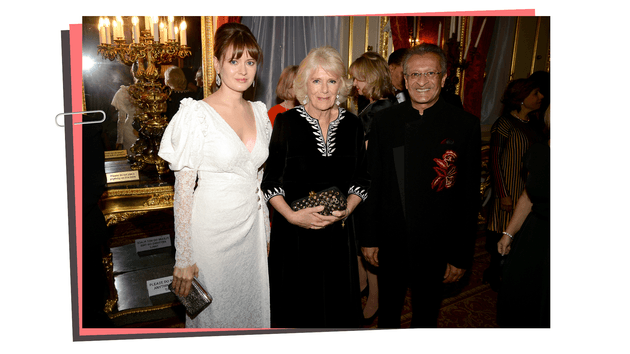 Mohamed Amersi with his partner Nadia Amersi and Queen Camilla in 2018
Dave J Hogan/Dave J Hogan/Getty Images
Mohamed Amersi with his partner Nadia Amersi and Queen Camilla in 2018
Dave J Hogan/Dave J Hogan/Getty Images
Since 2020 Amersi has retained Carter-Ruck to write to a diverse range of recipients: newspapers (including the Economist), the BBC, current and former MPs, a think-tank, a leading British university and unaffiliated individuals have all received letters from the firm on his behalf. It is not known how much Amersi has spent pursuing his critics, but estimates suggest it could stray into the millions of pounds. (Amersi told TBIJ that he had “no choice but to try to correct … numerous falsehoods and inaccuracies” that had been told about him.)
Charlotte Leslie, a former British MP, has faced two consecutive lawsuits from Amersi for circulating memos raising concerns about his credentials: the first a data-protection claim, the second a libel suit. Both failed, and the judge presiding over the libel case was excoriating: “Subjecting a person to successive civil claims can be a hallmark of abusive conduct,” Mr Justice Nicklin wrote, and struck out the libel claim in full. Amersi tried to appeal the judgment, and was denied. “When a rich man wants to silence and destroy someone, they go to the courts,” concluded David Davis, a Conservative MP, in remarks to parliament. (Amersi told TBIJ Davis had “abused the sacred right of parliamentary privilege”, and that the judges’ rejection of his claims was “a travesty of justice”.)
Carter-Ruck even went as far as to track down Michaela Ahlberg, a Swedish business-ethics adviser who had given an interview to the BBC and the Guardian about a deal Amersi advised on.
Telia, a Swedish telecoms group, hired Ahlberg after a bribery scandal. When the BBC and the Guardian, working together on an investigation into the deal, asked Ahlberg for comment, she thought carefully about what she said. She is adamant that she didn’t accuse Amersi of corruption, but said that the deal – rather than Amersi himself – was corrupt. She also said that references to potential wrongdoing by a “Mr XY” mentioned in an independent law firm’s review of Telia’s compliance procedures did indeed refer to Amersi. (Amersi adamantly denies any involvement in or knowledge of wrongdoing at Telia and has not been named in the US Department of Justice’s investigation into corruption there.)
Two months after the interview aired, towards the end of 2021, Ahlberg received a letter from Carter-Ruck accusing her of making “appalling allegations”, and saying that she had “distorted … the facts” and caused “serious harm and distress” to its client, Amersi. It concluded with a clear threat to sue. “I really felt my heart racing,” Ahlberg recalled over a video call from her home in Gothenburg. “I didn’t know [British libel law] was so different [from Sweden’s].”
A City of London law firm agreed to represent her pro bono. It responded to the threat briefly but firmly: Ahlberg would not be retracting her comments. Subsequent letters escalated the attack on her credentials, integrity and motives: “Either your client did not carry out her role at Telia with reasonable care and skill,” one read, “or she chose deliberately and maliciously to cause damage to our client by making defamatory statements about him which she knew to be false.” Eventually the letters ended.
Amersi, who is currently suing the BBC over the programme in which Ahlberg’s comments appeared, told TBIJ: “I remind you that the individual made defamatory allegations about me … in the full knowledge that they would be broadcast to millions of people. I am entitled to enforce my legal rights.” (The BBC stands by its story.)
Ahlberg was bewildered by the experience. “If it is not possible to … talk about red flags, so that people can judge for themselves what they think, then the UK is in terrible trouble.”
The Bureau newsletter
Subscribe to the Bureau newsletter, and hear when our next story breaks.
In February 2022 Russian tanks crossed into Ukraine. Shortly afterwards British parliamentarians erupted in fury at the role of Russian money in London’s reputation-management industry, a development that surprised journalists who had been trying in vain for years to draw their attention to it.
Dominic Raab, then justice secretary, promised MPs an end to “David and Goliath” battles between journalists and academics, and “billionaire oligarchs, some of whom bankroll the Kremlin”. He announced a plan to try to define abusive litigation, or SLAPPs, and regulate it. “We in this House cannot, and will not, allow our courts and our justice system to be used by those kleptocrats to intimidate and harass those who lift the lid on their murky dealings and wrongdoing,” he said.
Bob Seely, a fellow Conservative MP went further, using parliamentary privilege to raise the explosive question of whether “the senior partners in firms such as Carter-Ruck, CMS, Mishcon and Harbottle & Lewis will consider whether they feel that they have played an entirely negative role in enabling Kremlin neo-fascism”. (When approached by TBIJ the firms all strongly rejected any suggestion that they had engaged in abusive lawsuits, and some were highly critical of Seely’s own fact-checking abilities.)
In January 2023 pressure for action grew. It emerged that London lawyers acting for Yevgeny Prigozhin, then head of Wagner, the Russian mercenary group, had secured a waiver from the British government in 2021 allowing him to sue a British journalist for defamation in spite of being under international sanctions. Prigozhin went after Eliot Higgins of Bellingcat, an investigative outfit, on the basis of five tweets that cited articles linking Prigozhin to Wagner (the case failed and Prigozhin later admitted to being in charge of the mercenaries).
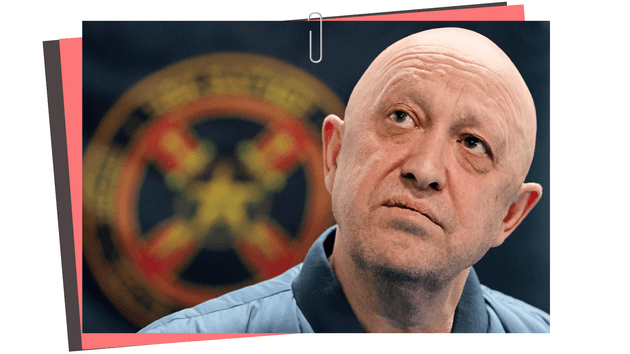 The late Yevgeny Prigozhin sued a journalist in the UK who linked him to the Wagner Group mercenaries he later admitted running
Sipa US/Alamy Live News
The late Yevgeny Prigozhin sued a journalist in the UK who linked him to the Wagner Group mercenaries he later admitted running
Sipa US/Alamy Live News
Britain’s legal regulator stepped up. Lawyers are “not simply ‘hired guns’”, the Solicitors Regulation Authority said in a statement in February 2023. “That means they should not bring cases which are not properly arguable, bring excessive or oppressive proceedings, or act in a way which could mislead or take advantage of others during proceedings.” The regulator, which has powers to investigate and prosecute solicitors, said it would step up policing. (The organisation’s chief admitted its punitive power was in practice very limited: the maximum fine it can impose is £25,000, which he likened to a “pea-shooter against a tank”.)
On 26 October 2023, the government took a step towards fulfilling its promise, adding an anti-SLAPP provision to a bill on economic crime. According to the new law, if a case is defined as a SLAPP, an English judge can now dismiss it at an early stage to avoid spiralling costs for the defendant.
Libel lawyers reacted immediately, with some saying the new legislation wasn’t the right tool to tackle abusive lawsuits and risked being unfair to people with a genuine claim. Dozens of lawyers (more of them from Carter-Ruck than any other firm) formed a body to represent their concerns. This organisation, the Society of Media Lawyers, wrote to the solicitors’ professional body on 27 October decrying a “media and regulatory frenzy” which “grossly exaggerates the problem [of SLAPPs], and unfairly singles out media lawyers for criticism.”
For all the press it has generated, the new law has obvious limitations. It only applies to reporting or campaigning that is specifically focused on economic crime. The technical advantages that English libel law offers to claimants remain untouched, as do libel lawyers’ astronomical fees. Campaigners continue to demand a standalone anti-SLAPP law that stretches beyond economic crime.
The law also affords solicitors plenty of scope to argue about the definition of a SLAPP. Skirmishes are already beginning. Earlier this month Michelle Mone, a Conservative peer, admitted to the Guardian that she had links to a company that had won lucrative government contracts for medical supplies during the pandemic, after having hired lawyers to fire off threatening letters to journalists who suggested as much. With some mooting that such tactics fell into the category of abusive litigation, her (now former) lawyer, Eddie Parladorio of Hanover Bond Law, insisted that the letters he had sent could “in no way be considered a SLAPP”.
Carter-Ruck’s grey offices in Fetter Lane don’t seem to be emitting a sense of panic. A libel lawyer at a different firm said that Carter-Ruck’s solicitors believe the legislation will only be practically applicable to a small minority of cases. “My impression is that they aren’t too concerned.”
TBIJ is a member of the UK Anti-Slapp Coalition, an informal working group making the case for a meaningful and structural response to SLAPPs.
Reporters: Ed Siddons and Matthew Valencia
Impact Producer: Lucy Nash
Enablers editor: Eleanor Rose
Deputy editors: Chrissie Giles and Katie Mark
Editor: Franz Wild
Production editor: Frankie Goodway
Fact checkers: Alice Milliken and Gareth Davies
Illustrator: Daniel Stolle for TBIJ
Our Enablers project is funded by Open Society Foundations, the Hollick Family Foundation, Sigrid Rausing Trust, the Joffe Trust and out of Bureau core funds. None of our funders have any influence over our editorial decisions or output.
-
Area:
-
Subject:





